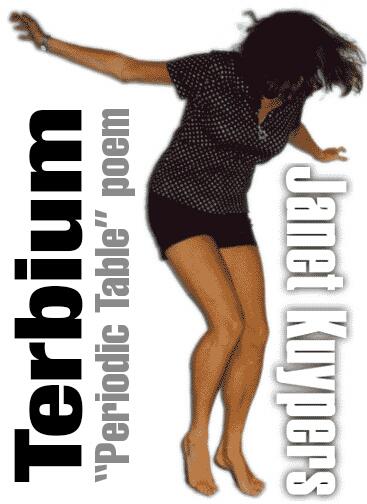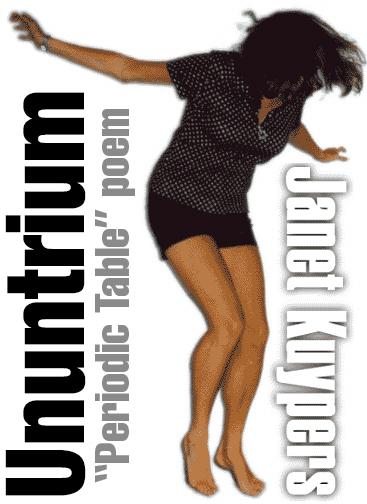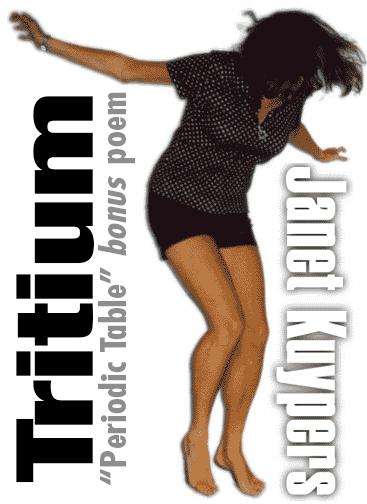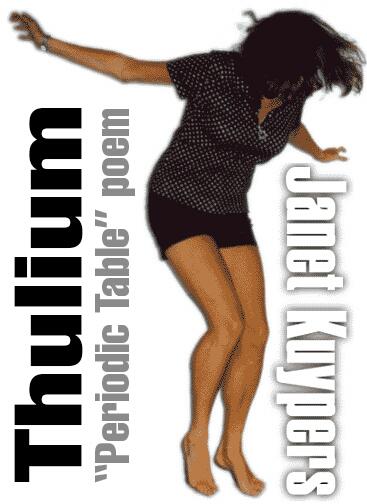Terbium
Janet Kuypers

from the “Periodic Table of Poetry” series (#65, Tb)
7/17/13
Looking for better sound
remains at the top of the list.
Having better stereo speakers
at all group parties, meetings or settings,
having a portable sound system
anyone could take with them,
even using sound while in the car
to reduce traffic noise, hear better music,
or talk hands-free on your smart phone.
The possibilities seem endless,
but stereo speakers take up space —
so we need to use science and technology
to even help us meet our audio needs.
Companies create better and better
sound systems, earbuds for iPods
have grown smaller and smaller,
even with noise-canceling technology…
There has to be a way to use the world
around us to get us exactly what we have
decided we need.
So, after just a little research,
I discovered an element twice as common
as silver on this planet, and when it is mixed
into a compound, Terbium can help create
a “Soundbug” speaker that can turn
any flat surface into a flat panel speaker.
(Any flat surface, like an office window,
or your dining room table at home.)
You see, the Terbium-filled Soundbug
can be plugged into a headphone socket
and then suction to any flat surface —
literally turning that surface into a speaker.
Now, this Terbium-rich Soundbug
is only the size of a computer mouse,
and retailing at less than fifty bucks,
they’re targeting this to the youth market;
but a wide-range of technology users
are going to love this little gadget
that can re-purpose everyday flat surfaces
into speakers for all sorts of sound needs.
The thicker the flat material surface, the
better the sound quality of the Terbium-laced
Soundbug speaker, and yeah, the resonance
of the speaker material (wood, glass, metal)
can effect the final sound quality,
but in theory you could daisy-chain
a few of these Terbium Soundbugs together
to excite multiple electrical currents of the music
players, to excite the mock speakers,
to bring every party to life in richer stereo.
Now, I know Terbium is like a
“Swiss Army knife” for cancer diagnosis,
and I know it’s green luminescence
gives color enrichment to tee tees
and is even used in fluorescent lamps,
or lasers, or semiconductor devices…
But this whole “using what we have
to multi-purpose what we have” idea
is really beginning to stick with me.
This audio technology can work with
magnetostriction, like, in a car instead
of in a business meeting or a party:
in a car, the Terbium Soundbug
could create noise-insulating windows,
blocking out the excessive sounds of traffic
(and you know how I hate the sound of traffic…).
But to business workers in a car,
the mobile phone version of the Terbium
Soundbug could be stuck to a car windshield,
to allow hands-free, headset-free talking.
(Well, that may cost a little more
than the indoors Terbium Soundbug,
but no price is too high to stop people
from staring at their phones while driving,
right?)
So yeah, although it is more common
on earth than silver, Terbium may still be
hard to get sometimes — but if we can find
this many uses for this element,
I’m sure it’s demand will increase, because
pretty soon, Terbium will be desired
more than anything.





